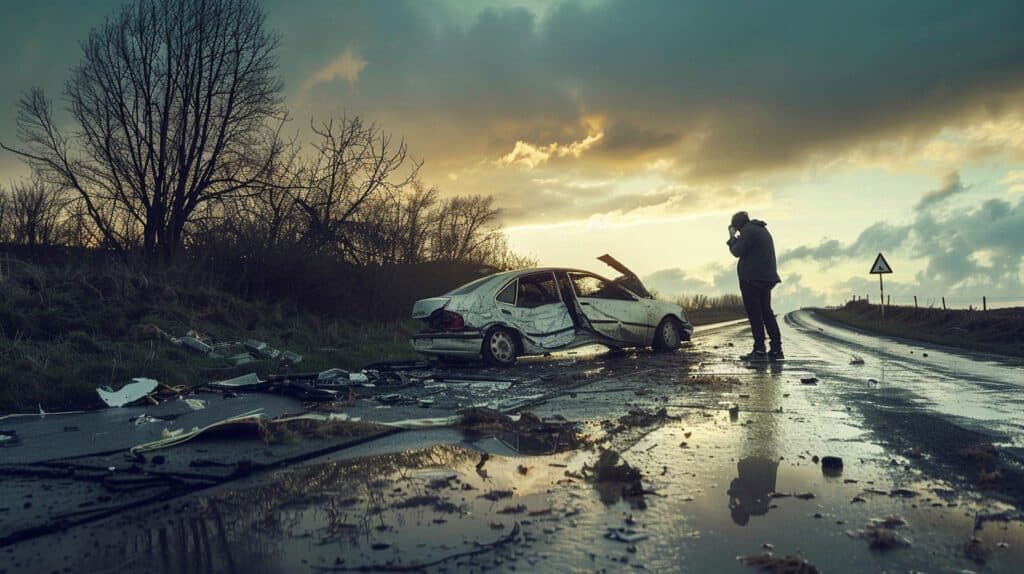Experiencing a car accident can be an overwhelming mixture of fear and confusion. Having gone through this turmoil myself, I deeply understand the uncertainty that follows, despite being aware that nearly 6 million motor vehicle crashes occur in the U.S. each year.
This article is designed to be your straightforward guide through the complexities you now face post-accident, aiming to simplify this process for you as much as possible. Let’s forge ahead together and demystify these steps one by one.
Key Takeaways
Right after a car accident, check if anyone is hurt and move to a safe spot. Turn on your hazard lights.
Call 911 if someone is injured, and always exchange insurance information with the other driver without blaming anyone.
Take lots of photos of the accident scene from different angles, including both cars and any visible damage. This will help you later.
Notify your insurance company about the accident quickly to start the claims process. An adjuster will come to check your car’s damage.
If you’re at fault in an accident, contact your insurance right away. If not, still document everything and report it to your insurance for support.
Table of Contents
Immediate Steps After a Car Accident

Right after a car accident, it’s crucial to act fast—make sure everyone is okay, first and foremost. Then, get to safety as soon as you can; it’s your top priority.
Check for Injuries
I always make it a priority to check for injuries immediately after any car crash. It’s crucial—my safety, and that of any passengers, depends on quick action. Calling for medical help without delay can be a lifesaver, especially in accidents where injuries aren’t immediately obvious.
After ensuring everyone’s okay or attending to injuries the best I can, I hit the emergency flashers. This simple step alerts other drivers and helps prevent further accidents. Safety comes first, whether it’s mine or someone else’s on the road with me.
Ensure Safety of Passengers
Right after a car accident, my first thought is the safety of everyone in the car. It’s crucial to stay calm and act fast. Here’s what I do:
- Check if anyone is hurt. I ask each passenger if they’re okay to quickly assess injuries. If anyone is injured, I don’t move them unless there’s an immediate danger.
- Turn on hazard lights immediately. This signals other drivers that something’s wrong and to approach carefully, reducing the risk of another collision.
- Encourage everyone to use their seatbelts until we’re sure it’s safe to get out. Seatbelts can protect us from potential aftershocks or additional collisions.
- Find a safe spot. If the car is drivable and there’s a nearby area away from traffic, I carefully move the vehicle there. Safety comes before assessing damage.
- Open windows slightly if we’re waiting for help. This ensures we have fresh air and can communicate with emergency responders or others outside the vehicle.
- Keep an emergency kit in the glove compartment — it has first aid supplies, water, and blankets. This way, we’re prepared for minor injuries or having to wait for help in bad weather.
Move to a Safe Location
After a car crash, I make it my first order of business to move to a safe spot. This means pulling over where there’s enough light and turning on those emergency flashers. It’s not just about me; it’s for the safety of everyone in the car—kids, pets, you name it.
Making sure they’re out of harm’s way is crucial.
Finding that well-lit area helps other drivers see us clearly, preventing any more accidents from happening. It’s all about quick thinking and ensuring we’re not causing any additional trouble on the road.
Keeping everyone secure while help arrives makes all the difference.
Reporting the Accident

After the accident, making a call to 911 is crucial; it ensures everything gets documented legally. Next up, you’ll swap info with the other driver — names, insurance details, license plate numbers…
It’s all part of building your case.
Call 911
I immediately dial 911 if someone is hurt after a car accident. It’s crucial, really. The dispatcher needs key details—where we are, what happened, and how many people need help.
I stay calm and clear; these folks are pros, but they rely on me for accurate information.
While waiting for the ambulance or police, I don’t move anyone injured unless there’s an immediate danger. Keeping everyone safe is my top priority until help arrives. This step isn’t just about doing the right thing; it’s also about legal responsibility and ensuring that emergency services have all they need to make quick decisions.
Exchange Information with Other Driver
After a car accident, one of the key steps is exchanging information with the other driver. This move is crucial before we part ways.
- First off, I make sure everyone’s okay, then get right to swapping details.
- I pull out my driver’s license and insurance card. These are essentials for any info exchange.
- We exchange names—full ones. No nicknames or just first names.
- Next, we share our addresses. It’s about knowing where official docs might need to go.
- Phone numbers come after. This way, we can contact each other if something comes up or more details are needed.
- I jot down his car’s make, model, and license plate number. Helps in identifying the vehicle later on if needed.
- Insurance companies and policy numbers are shared too. Important for the claims process.
- We avoid discussing who’s at fault—just stick to facts without pointing fingers. The insurance companies will figure this out.
Document the Accident Scene
Having exchanged information with the other driver, I next focused on documenting the accident scene. This step is crucial for insurance claims and legal purposes, and could be vastly important if you need to consult with car accident attorneys in Dallas.
Here’s how I went about it:
- I grabbed my phone immediately to start taking photos. Captured shots from different angles to show the whole story. This included both cars, any visible damages, and specific details like skid marks on the road.
- Snapped pictures of the surrounding area too. These images would help to paint a clear picture of the environment and might reveal factors that contributed to the accident.
- Made sure to photograph street signs or landmarks near the accident site. This would serve as evidence of where the incident occurred.
- Didn’t overlook capturing the weather conditions at that moment. It could be an influential factor during fault determination.
- Took close – up photos of my injuries if any were present. Personal injury is a significant part of insurance claims.
- Jotted down notes on my phone about how the crash happened while my memory was fresh. Included every little detail I could recall – from speeds to directions, and even reactions.
- Gathered contact information from witnesses. Their accounts could provide invaluable insights into what happened.
- Saved all these documents and photos in one folder on my cloud storage immediately — no risk of losing them.
Starting the Insurance Claims Process

Jumping into the insurance claims process, you’ll want to ring up your provider—knowing how they assess car damage can really smooth things out. Keep reading, there’s more good stuff ahead.
Notify Your Insurance Company
I got on the phone with my insurance company right after the accident. They told me an adjuster would come out to inspect my car. This person’s job is to figure out who was at fault and how much fixing my ride will cost.
It felt good knowing they were handling it, even though I was still shaken up from the crash.
Next, they walked me through what would happen with my claim. They mentioned something about checking if the other driver had liability insurance or if I’d need to tap into my uninsured motorist coverage.
The whole process sounded complex, but knowing there was a plan in place helped ease some of that anxiousness away.
Understanding the Evaluation of Vehicle Damage
After my car accident, the insurance company sent out an adjuster. This person’s job was to look over my vehicle closely and figure out how much it would cost to fix it. They checked every part of the car for damage.
It’s important because this determines if I’m at fault and how much they’ll pay after I cover my deductible.
Sometimes, fixing the car costs more than it’s worth—this is what they call “totaled.” If that happens, how much money I get back depends on my insurance coverage details. Keeping good records is crucial here.
Photos and notes can make a big difference later if there’s a dispute or additional damages come up.
Dealing with the Aftermath

After handling the initial shock and steps, dealing with what comes after a car accident—like managing your insurance claims or any legal issues—requires patience and persistence.
Keep reading to learn how to smoothly navigate these waters.
Notifying the DMV
I’m aware that the rules about reporting car accidents to the DMV vary by state. It’s my job to find out what Texas requires. Some situations demand immediate notification, especially if there’s significant property damage or personal injury protection claims are involved.
I’ll check if a form needs to be filled out and submitted within a certain timeframe.
It hit me that not every fender bender requires DMV notification, but I don’t take chances with more serious crashes. If legal liability comes into play or the repair costs suggest my car is a total loss, notifying the DMV becomes crucial.
I keep all documents ready, including the police report and insurance adjuster’s findings, to ensure everything is in order for smooth processing with them.
Handling Accidents That Are Your Fault
After notifying the DMV about the incident, it’s crucial to face any accidents that are my fault head-on. First, I contact my insurance agent immediately—time is of the essence. It’s important to be honest and provide all necessary details about the accident.
The insurers then begin their work; they send out an adjuster to inspect the vehicle damage and start their investigation into who was at fault.
The adjuster plays a key role in determining legal liability and repair costs. This process might seem daunting, but it’s there to ensure fairness for everyone involved. While waiting, I make sure not to admit fault at the scene or sign any documents without consulting my insurer first.
Knowing that contributory negligence can affect how responsibilities are divided helps me stay informed throughout this process.
Handling Accidents That Are Not Your Fault
I check for injuries first, then make sure everyone’s safe. Moving to a secure spot is key if the accident scene allows it. I call 911 immediately, ensuring help is on the way. Exchanging information with the other driver comes next – names, contacts, insurance details are all crucial.
Then, I start documenting everything: pictures of damage to both cars, the surrounding area… anything that might help paint a clear picture later.
Notifying my insurance company quickly follows; they need to know what happened from my point of view. Understanding that legal liability isn’t immediate and requires an adjuster’s investigation keeps me grounded – patience is essential here.
I remember different states have their own rules about reporting accidents and involving law enforcement, so I stay informed about these laws to ensure compliance every step of the way.
FAQs About What to Do After a Car Accident
What should I do right after a car accident happens?
First, check for injuries and call emergency numbers. Then, move to safety and exchange info with the other driver—like names, auto insurance details, and contact information.
Do I need to report every car crash?
Yes, always report it to the police, especially if there are injuries or significant damage. The National Highway Traffic Safety Administration suggests this helps with traffic safety and legal issues.
How do I know if my insurance covers the damages from a fender-bender?
Check your policy or call your insurance agent directly. They’ll tell you about coverage like no-fault insurance or underinsured motorist protection that applies to your situation.
Can taking photos at the accident scene help me with my insurance claim?
Absolutely! Photos can show details about the crash scene, damages to all cars involved, and any warning signs missed., This evidence supports your claim with clear facts.
Should I seek medical attention even if I don’t feel hurt after getting rear-ended?
Yes – some injuries aren’t obvious right away…. visiting an emergency room ensures you’re okay and documents any harm for potential claims related to pain and suffering later on.
When should I contact a lawyer after a car wreck?
If there’s disagreement over who’s liable for serious injuries or complex negotiations with insurance carriers – getting professional liability advice from a lawyer might be wise. They can guide you through claims, dealing with other parties, and ensuring you get fair compensation.


